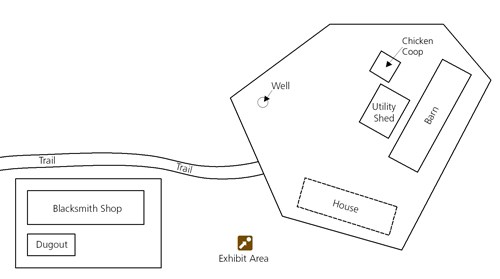|
"My home ranch lies on both sides of the Little Missouri, the nearest ranch man above me being about twelve, and the nearest below me about ten, miles distant." Theodore Roosevelt 1887 The HistoryTheodore Roosevelt came to the North Dakota Badlands in September 1883 to hunt buffalo. By the end of his 15-day hunting trip, he had entered the cattle business with the purchase of the Chimney Butte Ranch, also known as the Maltese Cross Ranch. Five months later his wife, Alice, and his mother died on the same day. Grief stricken, Roosevelt decided to leave the East and increase his interests in the cattle business. In March of 1884 he wrote to Bill Sewall, his hunting guide on an earlier hunting trip in Maine: "I hope my Western venture turns out well. If it does, and I feel sure that you will do well for yourself by coming out with me, I shall take you and Dow (another Maine woodsman who had served as Roosevelt's guide) out next August. Of course it depends on how well the cattle have gotten through the winter. The weather has been very hard and I am afraid they have suffered somewhat; If the loss has been very heavy I will have to wait a year longer before going into it on a more extended scale. So, as yet, the plan is doubtful." After attending the 1884 Republican convention in June, where the candidate he was backing lost, Roosevelt left for the Dakota Territories to look for solitude. His cattle had wintered very well so he decided to put in 1,000 more head and "make it my regular business." During that visit, Roosevelt selected the location for a second ranch, naming it the Elkhorn. He purchased the rights to the site, located thirty-five miles north of Medora, from the previous occupant for $400.00. By mid-October Sewall and Dow had moved onto the site of the Elkhorn Ranch and were cutting and collecting cottonwood logs for the ranch house. Working through the winter, they completed the building by the spring of 1885. The house was 30 feet by 60 feet, with seven foot high walls, and contained eight rooms and a piazza (porch) along the east wall. Several other buildings were constructed on the site: a barn consisting of two 16 x 20 stables with a 12 foot roofed space connecting them; a cattle shed; chicken house; and a blacksmith shop. In August 1885 Dow visited his home in Maine and returned to the Elkhorn with his wife and Mrs. Sewall, as well as the Sewalls' small daughter. In 1886 both women gave birth to sons at the ranch. 
NPS Sewall and Dow operated the ranch for Roosevelt until the fall of 1886 when they returned to Maine, after "squaring accounts" with Roosevelt. Roosevelt then turned the operation of the Elkhorn over to Sylvane Ferris and Bill Merrifield, his managers and partners at the Maltese Cross Ranch. After the disastrous winter of 1886-87, Roosevelt lost approximately 60% of his cattle. Although now living full time in New York, he continued to maintain both his ranches; the Elkhorn remaining his center of operation. After a late summer visit to the Elkhorn in 1890, Roosevelt apparently abandoned the ranch. On October 20 he wrote Sewall, " ... This is the last year I shall keep the ranch house open; I have just parted with Merrifield. Sylvane will take care of the cattle now." Roosevelt sold the ranch and buildings to Sylvane Ferris in 1898. Gradually the buildings were stripped of their furnishings and, according to a local stockman, by 1901 "every scrap of the Elkhorn Ranch had disappeared with the exception of a couple of half rotted foundations." In his writings Theodore Roosevelt often referred to the Elkhorn as his "home ranch." His vivid descriptions of it, and of ranch life, enable his readers to imagine how things must have been. "My home ranch-house stands on the river brink. From the low, long veranda, shaded by leafy cotton-woods, one looks across sand bars and shallows to a strip of meadowland, behind which rises a line of sheer cliffs and grassy plateaus. This veranda is a pleasant place in the summer evenings when a cool breeze stirs along the river and blows in the faces of the tired men, who loll back in their rocking-chairs (what true American does not enjoy a rocking-chair?), book in hand--though they do not often read the books, but rock gently to and for, gazing sleepily out at the weird-looking buttes opposite, until their sharp outlines grow indistinct and purple in the after-glow of the sunset." From Hunting Trips of a Ranchman by Theodore Roosevelt Additional Resources:
|
Last updated: January 28, 2025
